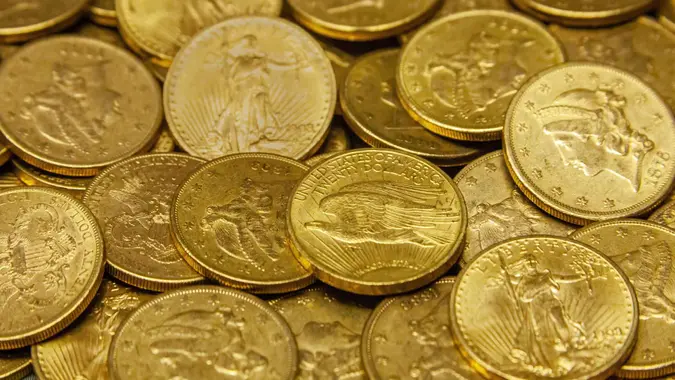Crypto Credit Cards Are Enticing, but There Are a Few Things You Should Know First

Commitment to Our Readers
GOBankingRates' editorial team is committed to bringing you unbiased reviews and information. We use data-driven methodologies to evaluate financial products and services - our reviews and ratings are not influenced by advertisers. You can read more about our editorial guidelines and our products and services review methodology.

20 Years
Helping You Live Richer

Reviewed
by Experts

Trusted by
Millions of Readers
Crypto credit cards are becoming more mainstream, with several financial giants in the space — including Visa and Mastercard — partnering with crypto companies to launch their own. But while they have enticing attributes, customers should take into consideration several factors before getting one.
Learn: What Is the Next Big Cryptocurrency To Explode in 2021?
Discover: Competitor Investing Platform to Robinhood Adds Crypto Trading Capabilities
In July for example, Visa launched a crypto-linked credit card with BlockFi. The card enables recipients to earn 1.5% back in bitcoin on every purchase they make; a 3.5% bitcoin rewards rate for the first 90 days; and they can also earn 2% back in bitcoin on every dollar spent over $50,000 annually. For every transaction cardholders make, they can earn bitcoin rewards. Once redeemed, bitcoin rewards are transferred to a cardholder’s BlockFi Interest Account (BIA) where rewards can earn crypto interest, meaning even more bitcoin, according to a BlockFi spokesperson.
“In the future, we also plan to allow cardholders to pay their balances using Stablecoins,” according to BlockFi.
Earlier this week, BlockFi said that within 90 days of launching the first credit card to give Bitcoin as a reward to cardholders, credit card spend is currently pacing toward over $2 billion in annualized spending based on growth projections, according to an announcement.
The rewards can be appealing, given Bitcoin’s recent surge and it being the best performing asset so far this year, beating both stocks and commodities.
“In August, BlockFi cardholders who were paid out rewards at their 3.5% intro rate earned an effective rate of over 4.25%, while customers earning the standard 1.5% back were earning a 1.8% effective rate due to Bitcoin’s recent price appreciation. With the intro rewards rate of 3.5%, cardholders can earn an additional $100 in Bitcoin in their first three months. For comparison, if someone had earned $100 of Bitcoin in 2017, it would be worth over $4,000 in Bitcoin today.”
Rival Mastercard also said it is launching a crypto card with Gemini. The card will enable holders to earn up to 3% on dining, 2% on groceries and 1% on other purchases, according to Gemini’s website. Rewards will be in Bitcoin or any crypto on Gemini, and there will be no annual fee.
Gaurav Gollerkeri, general manager of payments at BlockFi, told GOBankingRates that crypto cards “are consistent with the experience folks have with traditional rewards-based credit cards.”
“It’s been a great addition to our retail product suite for our current clients, but also has attracted new folks who wouldn’t classify as crypto-fluent. Folks know how to use a credit card and to pay it off monthly, but we’re encouraging new behaviors with traditional products. It’s a new entry point for BlockFi to encourage greater discourse around the exciting world of crypto,” he said.
However, one differentiator from traditional cards using fiat currency, is that cryptos are taxable.
More: 7 Best Credit Cards With Crypto Rewards in 2021
Shehan Chandrasekera, CPA head of tax strategy at CoinTracker.io, a platform helping customers calculate cryptocurrency taxes, told GOBankingRates that “the IRS treats cryptocurrency as property. As a result, whenever you spend your cryptocurrency to buy a good or service, that creates a taxable event for you. You have to track the cost basis and market value at the time of spending to come up with your capital gain amount.”
He added, however, that he sees people using them despite the tax burden, using tools such as CoinTracker to track taxes easily.
Several experts told CNBC that while it is probably unlikely that the IRS is going to come after you for a penny, it does mean that you are technically not complying with the law if you make a penny’s worth of gains when you buy a coffee and fail to track that as a gains event.
Another differentiator involves rewards. Blockchain News reports that rewards on certain credit cards might be limited to the card issuer’s selection of cryptocurrencies. “The Tomo Credit Card, for example, only offers reward points in Bitcoin, Ethereum and Litecoin. On the other hand, the Upgrade Bitcoin Reward Card exclusively offers Bitcoin rewards. Be sure to check the range of cryptocurrency rewards a credit card offers before signing up for an account,” it said.
See: What Is Crypto Mining and How Does It Work?
Find: 7 Best Ways To Start Investing With Little Money
In July, Visa said that consumers spent more than $1 billion worth of crypto on goods and services through their crypto-linked cards in the first six months of the year. Visa powers both cards that allow consumers to easily convert crypto to fiat and spend it as well as cards that allow them to spend fiat and earn crypto as a reward, according to CoinDesk. It also has partnerships with Coinbase and Circle.
More From GOBankingRates
- 5 Things Most Americans Don’t Know About Social Security
- The Best Cash-Back Credit Card Right Now
- 8 Best Cryptocurrencies To Invest In for 2021
- How Long $500K Will Last in Retirement in Each State
Last updated: Oct. 15, 2021
 Written by
Written by  Edited by
Edited by 

























